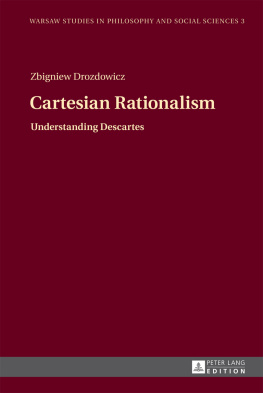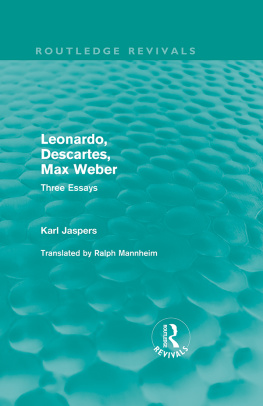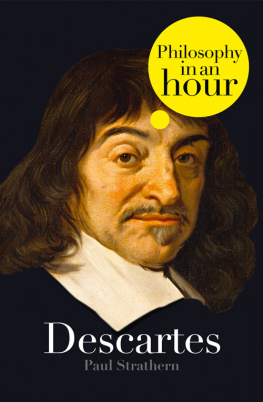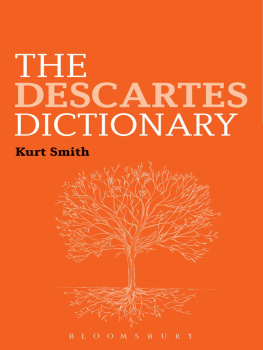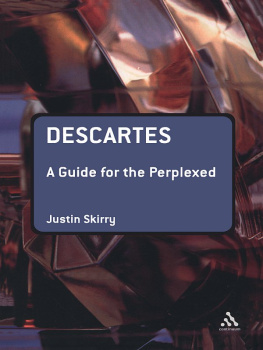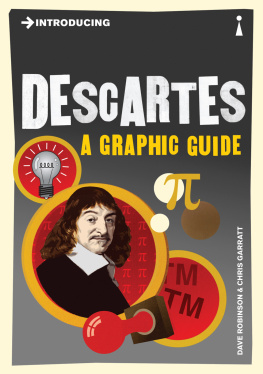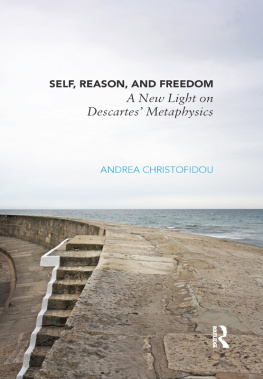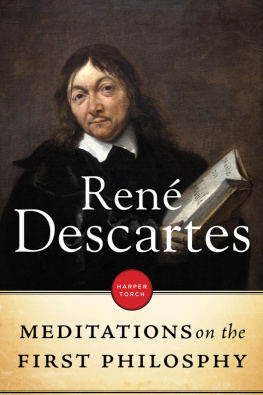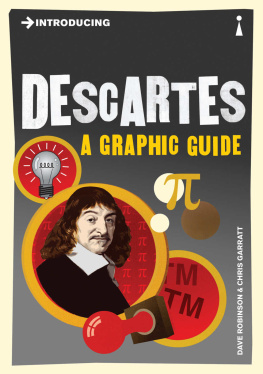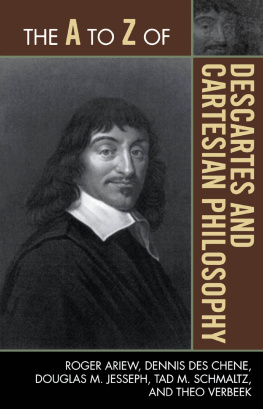Contents
WARSAW STUDIES IN PHILOSOPHY AND SOCIAL SCIENCES
Edited by
Tadeusz Szawiel and Jakub Kloc-Konkoowicz
VOLUME 3
Zbigniew Drozdowicz
Cartesian Rationalism
Bibliographic Information published by the Deutsche Nationalbibliothek
The Deutsche Nationalbibliothek lists this publication in the Deutsche Nationalbibliografie; detailed bibliographic data is available in the internet at http://dnb.d-nb.de.
Library of Congress Cataloging-in-Publication Data
Drozdowicz, Zbigniew.
Cartesian rationalism / Zbigniew Drozdowicz. -- 1 [edition].
pages cm. -- (Warsaw studies in philosophy and social sciences, ISSN 2196-0143 ; Volume 3)
Includes bibliographical references and index.
ISBN 978-3-631-66118-5
1. Descartes, Ren, 1596-1650. 2. Rationalism. I. Title.
B1875.D76 2015
194--dc23
2015019656
This publication was financially supported by the
Adam Mickiewicz University in Pozna
Reviewed by Honorata Jakuszko
ISSN 2196-0143
ISBN 978-3-631-66118-5 (Print)
E-ISBN 978-3-653-05611-2 (E-Book)
DOI 10.3726/ 978-3-653-05611-2
Peter Lang GmbH
Internationaler Verlag der Wissenschaften
Frankfurt am Main 2015
All rights reserved.
Peter Lang Edition is an Imprint of Peter Lang GmbH.
Peter Lang Frankfurt am Main Bern Bruxelles New York Oxford Warszawa Wien
All parts of this publication are protected by copyright. Any utilisation outside the strict limits of the copyright law, without the permission of the publisher, is forbidden and liable to prosecution.
This applies in particular to reproductions, translations, microfilming, and storage and processing in electronic retrieval systems.
This publication has been peer reviewed.
www.peterlang.com
About the author(s)/editor(s)
Zbigniew Drozdowicz is Professor at Adam Mickiewicz University in Pozna and Head of the Chair of Religious and Comparative Studies.
About the book
Descartes gave the human intellect the central role in rationalism, his system therefore is a variant of intellectual rationalism. Other forms of rationalism had emerged in scholastic philosophy and the ancient philosophies of Plato and Aristotle. While Descartes had reservations with respect to all of them, he still adopted some of their elements: not even such a self-directed and critical philosopher as Descartes could have proceeded on the difficult journey towards truth without any baggage of tradition whatsoever. Those who treated this baggage as a useless burden and have attempted to pursue truth without carrying it, have only discovered things which had long been known.
This eBook can be cited
This edition of the eBook can be cited. To enable this we have marked the start and end of a page. In cases where a word straddles a page break, the marker is placed inside the word at exactly the same position as in the physical book. This means that occasionally a word might be bifurcated by this marker.
| 7
Descartes belongs to those philosophers whose comprehension has always posed a challenge; not only for those who deal with philosophy occasionally, but also for the professionals. This stems not only from the fact that he composed his works in Latin and made frequent use of scholastic terms the key obstacle seems to be that his philosophy constitutes a multifaceted system. Omitting one of its constitutive elements, or taking it out of context, would often lead even in his own lifetime to convictions being ascribed to Descartes that he had in fact openly disavowed. His opposition would rarely be treated seriously enough so as to put a corrective on the accepted understanding of his philosophy. On the other hand, he would often be accused of attempting to hide his actual convictions, if they happened not to match the accepted wisdom of the scientific, philosophical and theological authorities of his day, i.e., such ideas whose dissemination might spell trouble for him. At a later stage, his philosophy would be inspected for signs of such assumptions and solutions which he might not have been aware of, or perhaps of which he had been too loosely aware, so that their clear articulation would elude him.
It seems an occurrence common enough that the so-called silent assumptions find ways into our reasoning. This is also true of such philosophers as Descartes, who chose to become aware of anything they can and should become aware of as the main goal of their life, so as to be sure of having obtained authentic knowledge. His formula: cogito ergo sum might seem to constitute the article of faith adhered to by all the proponents of the most broad, deep and thorough probing of consciousness. This formula just as any general formula does nevertheless open a space for various interpretations, conclusions and evaluations. Still, when it comes to the Cartesian philosophy, the available place for manoeuvre is in fact so vast as to allow for positioning it on some occasions as an example of refined intellectualism, while at other times taking it to represent a case of an essentially simple mechanistic naturalism. Even if the latter variety could indeed be found in his physics and physiology, one should accept that in his system neither physics nor physiology constitute autonomous sciences, which could be of enough importance to determine the general character of his philosophy. This is at least how I understand his philosophy, while of course I do assume my understanding not to be the only possible or acceptable one.
My treatment of his philosophy within this book takes it to be a specific instance of rationalism. Descartes gave the human intellect the central role in this 7 | 8 system; thus, I consider it a variant of an intellectual rationalism. Other forms of such rationalism had emerged in the ancient philosophies of Plato and Aristotle, as well as later on in the scholastic philosophy. Descartes had some reservations with respect to all of them, while taking over some of their elements at the same time. It could not have been otherwise not even such a self-directed and critical philosopher as Descartes is capable to proceed on the great and difficult journey towards the truth without any baggage of tradition whatsoever. Those who would treat this baggage as useless burden and have attempted to pursue the truth without carrying it, have also merely been capable of discovering things which had long been known.
The key challenge is not to discard the baggage of tradition altogether, not even in making sure that carrying it becomes least burdensome, but rather to re-pack it in such a way that only those things are left in it which might prove useful in the quest for the truth or at least on the first stages of that quest. This was something Descartes was not merely aware of he also put a substantial effort into making a rational selection of the items in his intellectual backpack (e.g., during his education in the Jesuit College La Flche), so as to only retain what seemed truly indispensable for the realisation of his life plans. This constitutes but one aspect of his rationality, which he advised all the seekers of truth to assume. When it comes to my own attempt at understanding Descartes, I classify this aspect as a part of his life rationality. This kind of rationality is an important one, but still just one among many constituent parts of his rationalism. Following Descartes position expressed in the Discourse on Method, I treat it as a preparatory step providing foundations for actions to be planned and conducted later on.

